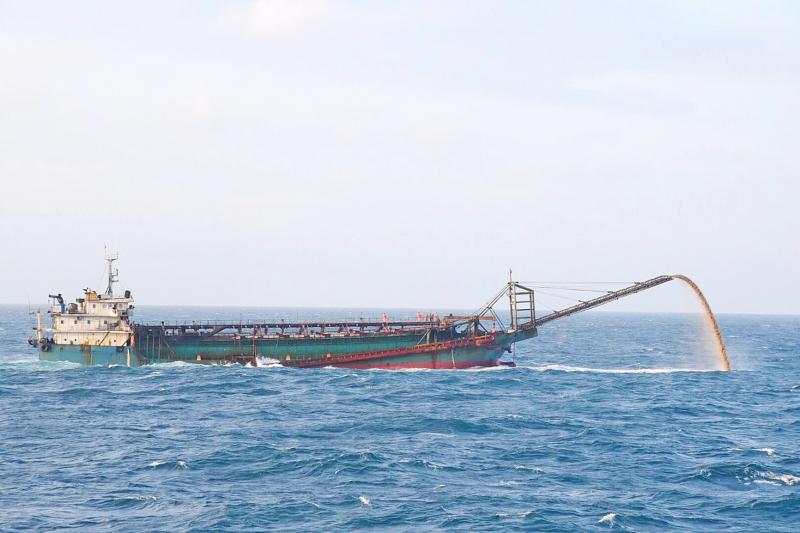DPP Legislator Lai Jui-lung (賴瑞隆) on Friday proposed an amendment to increase fines for the removal of rocks or soil from national land, after Chinese vessels were last year found removing sand from the nation’s beaches.
Under the Act on the Exclusive Economic Zone and the Continental Shelf of the Republic of China (中華民國專屬經濟海域及大陸礁層法), those extracting rocks or soil from national land without permission can be fined up to NT$50 million (US$1.66 million) and jailed for up to five years.
However, the amendment would stipulate a prison sentence of one to seven years, in addition to a fine of NT$5 million to NT$50 million, Lai said.

Photo courtesy of the Penghu County coast guard
Under the proposed amendment, those found surveying, exploiting, managing or maintaining resources on national land without permission would be fined NT$1 million to NT$5 million, he said.
The Coast Guard Administration in October last year detained the crew of two Chinese vessels off the coast of Penghu County, and sentenced each of the captains and 26 crew members to five or six months in prison, but this has not deterred Chinese vessels from stealing sand in the county, Lai said.
As of May 13, the coast guard has driven 1,231 Chinese vessels away from Taiwan’s waters, he said.
“This type of theft of our sand is greatly harmful to our marine ecology, our fisheries resources and our national security,” he said.
Current laws are too lenient to be a deterrent, he said, adding that stricter laws are needed.
Separately, DPP Legislator Kuan Bi-ling (管碧玲) also proposed an amendment to the act, which laid out similar prison sentences, but would increase fines to up to NT$100 million.
Echoing Lai’s statement, Kuan said the amendment was necessary to protect the nation’s marine ecology and resources from intentional destruction caused by the removal of sand, rocks and soil.

Japanese footwear brand Onitsuka Tiger today issued a public apology and said it has suspended an employee amid allegations that the staff member discriminated against a Vietnamese customer at its Taipei 101 store. Posting on the social media platform Threads yesterday, a user said that an employee at the store said that “those shoes are very expensive” when her friend, who is a migrant worker from Vietnam, asked for assistance. The employee then ignored her until she asked again, to which she replied: "We don't have a size 37." The post had amassed nearly 26,000 likes and 916 comments as of this

US President Donald Trump said "it’s up to" Chinese President Xi Jinping (習近平) what China does on Taiwan, but that he would be "very unhappy" with a change in the "status quo," the New York Times said in an interview published yesterday. Xi "considers it to be a part of China, and that’s up to him what he’s going to be doing," Trump told the newspaper on Wednesday. "But I’ve expressed to him that I would be very unhappy if he did that, and I don’t think he’ll do that," he added. "I hope he doesn’t do that." Trump made the comments in

Tourism in Kenting fell to a historic low for the second consecutive year last year, impacting hotels and other local businesses that rely on a steady stream of domestic tourists, the latest data showed. A total of 2.139 million tourists visited Kenting last year, down slightly from 2.14 million in 2024, the data showed. The number of tourists who visited the national park on the Hengchun Peninsula peaked in 2015 at 8.37 million people. That number has been below 2.2 million for two years, although there was a spike in October last year due to multiple long weekends. The occupancy rate for hotels

A cold surge advisory was today issued for 18 cities and counties across Taiwan, with temperatures of below 10°C forecast during the day and into tonight, the Central Weather Administration (CWA) said. New Taipei City, Taipei, Taoyuan and Hsinchu, Miaoli and Yilan counties are expected to experience sustained temperatures of 10°C or lower, the CWA said. Temperatures are likely to temporarily drop below 10°C in most other areas, except Taitung, Pingtung, Penghu and Lienchiang (Matsu) counties, CWA data showed. The cold weather is being caused by a strong continental cold air mass, combined with radiative cooling, a process in which heat escapes from